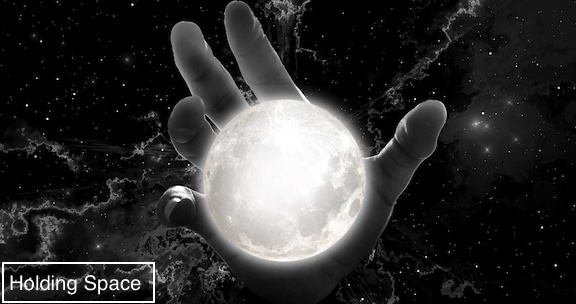Holding Space
by The Enigma
Way back when, on the rare occasion of having a conversation on the subject of race, I usually experienced a need to brace myself; that there would be an unintended offense, insult or discomfort that would occur in the course of the conversation. Undeniably, when this occurred, I would undertake the task of accounting for the unintended offense, insult or discomfort and awkwardly try to put the white person at ease.
Generally, during these occasions, a scenario with the white person/s would go like this: the conversation would commence; interest would be expressed; eagerness shown to learn more; a question or two asked to clear confusion and then the unbearable moment where a great big elephant enters the room asks to sit and right on our laps. In these moments, I would know what occurred and I am fairly sure the white person knew, but there was no attempt to ask: what just happened? Or did you notice an elephant sitting on our laps!
When I think about holding space, I think of holding something delicate in my hand – if I am too careful I may psyche myself out breaking the delicate item and if I am too careless I may break the delicate item regardless. A question emerges-how do I strike a balance between being too careful and too careless? Why is this important? The answer does not come easy.

For any undertaking, one must ask why it is worth doing it in the first place. So, when it comes to holding space, I ask myself, why is holding space important to me? Or maybe a better question is why do I need it? When I think of my experience with white people, these questions run through my mind. I talk, interact and have relationships with white people and I am learning to relate better to their challenge regarding the subject of race. When I think about the idea of holding space in a racial context and how it applies to my interactions, relationships and discussions with white people I see several uses.
The unbearable weight of the elephant would indeed constrain the conversation and restrict any curiosity or desire to learn to a diluted version of what could have been – the presence of the elephant downplayed and gradually faded from view – topic change. During these moments, I would despair over an opportunity being missed. Disappointment would set in. Missing the opportunity to increase the ability to relate, exchange and understand each other better illuminated the significance of both the elephant and our response to it! Occasions like these amplified my general sense of white peoples’ challenge to increase their capacity to understand, appreciate and genuinely relate to racial struggle. I have come to understand or at least start to appreciate that, for white people in general, learning to grapple in meaningful ways with the concept of race and how it applies to their lives is a big challenge!
Generally, to move a conversation on the subject of race to a place of substance is a heavy task. I think the word heavy is suitable here because the subject of race is packed with issues that carry a heavy weight. I think that one reason, generally speaking, white people have difficulty holding space is their challenge in bearing the weight of the subject. It is one thing to have the tools and skills to use and an entirely different species of issue to appropriately apply the knowledge to effectively use these tools and skills to truly hold space.
Nonwhite and white people for centuries have worked, interacted, communicated, had relations and occupied spaces throughout the history of the US. So, to start to think of the space aspect of this idea, I began by exploring it as a place where negotiations occur; where things are laid on the table and sorted through – this allows room for mistakes. In this space, misunderstandings can be cleared up and miscommunications can be explored. The hold aspect requires a bit more because essentially when I hold something I bear the weight of it and to bear the weight of something with another individual demands coordination, cooperation and awareness among other skills. When I reflect on my myriad experiences with white people, I think metaphorically about what we are holding?
To begin to respond to the question of what white and nonwhite are holding when they interact, I would say, possibility. We hold the possibility to learn, to understand and to appreciate each other in a more genuine way. With the idea of holding space, there is room to explore, experience and most important to learn. This is a start. This is a way to build a road map to authenticity.
To attempt to apply this idea, I have begun to explore how to hold white people in their defensiveness about race and racism. Learning to hold white people in their resistance I have learned a couple of things. By holding space, possibility opens up for both the white person and myself to reflect or at the very least to consider their defensiveness and resistance. In the event a semblance of reflection is achieved, I encourage them to strengthen their sense of the particular defensiveness or resistance that might be occurring at the time. This serves to strengthen their resolve to increase their ability to identify such instances. The way I see it, these small seemingly insignificant undertakings are stepping stones that eventually can lay the foundation for the development, exploration and maintenance of possibility.
Illustration description: Against a star-filled sky, a hand holds a single brightly-lit planet in its palm.
Image courtesy of Pick Pik dot com. https://www.pickpik.com/hand-moon-space-night-fantasy-sky-32906#google_vignette

Leave a Reply